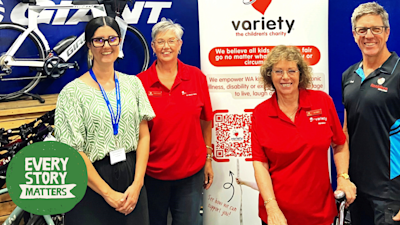The Australian Institute of Health and Welfare released a report in May 2021, providing key details about children who received child protection services from 2019–20.

Image: Two girls running outside holding hands.
The number of children in Australia coming to the attention of child protection services continues to rise, according to a new report. Unfortunately, the numbers of children in out-of-home care also continues to rise with over 46,000 children in care in 2019-2020.
The report, published by the Australian Institute of Health and Welfare (AIHW), offers key insights about the depth of child protection issues within our society.
Life Without Barriers has welcomed the release of this new data, which underscores the importance of our ongoing commitment to supporting vulnerable children and their families who are at risk of being separated by the child protection system.
One of the most significant trends revealed by the report was the experience of Aboriginal and Torres Strait Islander children, who were almost eight times more likely than non-Aboriginal and Torres Strait Islander children to be reported to child protection services.
“The overrepresentation of Aboriginal and Torres Strait Islander children in protection services is one of our most urgent issues as a community." - Jane French.
"We need to hear, respect and respond with the voices of Aboriginal and Torres Strait Islander people at the forefront to address this issue,” said Jane French, Executive Director of Child, Youth and Family at Life Without Barriers.
Family based care is by far the most common form of out-of-home care. As at 30 June 2020, the vast majority (92%) of children were in home‑based care, mostly with relative or kinship carers, or in foster care.
Another 6.6% of children were living in residential care, mainly used for children with complex needs. Approximately 30,600 of the 46,000 children in out-of-home care had been there for two years or more.
It is because of these long stays in care that the numbers of children in care in Australia continues to rise. We can help change this trend by focusing on reunification of children to their families whenever safe, as well as on prevention and family preservation.
Life Without Barriers is committed to supporting children and families to remain safe and together whenever possible and to making sure children in out-of-home care stay connected to their families. We do this by:
putting the needs of children, young people and families first, to help them thrive;
valuing a child's connection to culture, family, and community;
working with families to ensure children and young people are able to return home to a safe and supportive environment;
making sure that families are involved and included in the care of children in out-of-home care;
providing our foster and kinship carers with extensive training and 24/7 support to navigate their foster care journey;
welcoming carers and families in all shapes and sizes from all walks of life.
Our Strategy 2025 has a key focus on strengthening families because this is what all children need.
At Life Without Barriers, we all share the responsibility for child safety. Our ‘We Put Children First’ safeguarding program recognises that physical, emotional and psychological safety is the basis for healthy development and well-being. Ensuring that children are well cared for, protected from abuse and given the respect they deserve is an absolute, non-negotiable priority.


